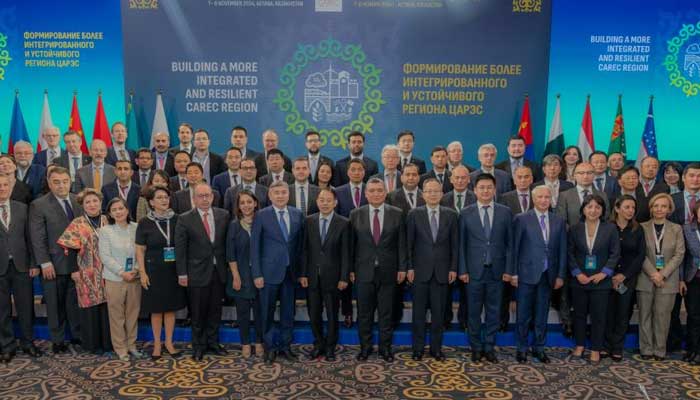23rd ministerial conference: Central Asian states’ forum launches climate project fund
Endorsement took place at 23rd CAREC Ministerial Conference held in Astana on Friday
ISLAMABAD: Member countries of the Central Asia Regional Economic Cooperation (CAREC) programme including Pakistan have endorsed a new Climate Change Action Plan (CCAP) and launched the CAREC Climate and Sustainability Project Preparatory Fund (CSPPF) to strengthen regional collaboration on climate resilience, low-carbon growth, and sustainable development.
The endorsement took place at the 23rd CAREC Ministerial Conference held in Astana on Friday. The ministers also endorsed the midterm review of the CAREC 2030 strategy, which recommended reinvigorating regional cooperation and enhancing operations toward climate-smart development and regional public goods, among others.
“The approval of the CAREC Climate Change Action Plan and the establishment of the Climate and Sustainability Project Preparatory Fund are significant milestones in our collective efforts to address climate change,” said Asian Development Bank (ADB) President Masatsugu Asakawa, who delivered a keynote address at the conference. “By working together, we can build resilient infrastructure, develop early warning systems, and create a greener future powered by renewable energy.”
The CAREC programme is a partnership of countries in Central Asia, the Caucasus, South Asia, and East Asia, and development partners aiming to promote sustainable development through regional cooperation. It facilitates practical, results-based regional projects and policy initiatives to accelerate economic growth and reduce poverty in the region. ADB hosts the CAREC Secretariat.
The CCAP, spanning from 2025 to 2027, prioritises initiatives to implement the CAREC Climate Change Vision. It focuses on four main areas to tackle climate challenges in the region. It aims to help countries better prepare for and respond to climate risks; enhance the water-energy-food nexus; promote low-carbon growth by reducing emissions and expanding renewable energy; and create a CAREC climate platform.
The CSPPF will assist CAREC countries in developing bankable regional climate projects aligned with their commitments under the Paris Agreement. Today, the ADB also signed fund contribution agreements with the Ministry of Finance of the People’s Republic of China and the Ministry of Economy and Finance of the Republic of Korea, generating a total of $5 million initial funding for CSPPF.
During his visit to Kazakhstan, Asakawa met President Kassym-Jomart Tokayev to discuss ongoing cooperation and future initiatives with the ADB. He will also participate in a ceremony celebrating 30 years of partnership between ADB and Kazakhstan and witness the signing of a loan agreement to reconstruct 208 kilometres of road in central Kazakhstan. Since Kazakhstan joined ADB in 1994, the bank has committed around $7 billion in support to the country through loans, grants, and technical assistance for both public and private sector development projects and initiatives. The ADB is committed to achieving a prosperous, inclusive, resilient, and sustainable Asia and the Pacific while sustaining its efforts to eradicate extreme poverty. Established in 1966, it is owned by 69 members—49 from the region.
-
 James Van Der Beek's Friends Helped Fund Ranch Purchase Before His Death At 48
James Van Der Beek's Friends Helped Fund Ranch Purchase Before His Death At 48 -
 King Charles ‘very Much’ Wants Andrew To Testify At US Congress
King Charles ‘very Much’ Wants Andrew To Testify At US Congress -
 Rosie O’Donnell Secretly Returned To US To Test Safety
Rosie O’Donnell Secretly Returned To US To Test Safety -
 Meghan Markle, Prince Harry Spotted On Date Night On Valentine’s Day
Meghan Markle, Prince Harry Spotted On Date Night On Valentine’s Day -
 King Charles Butler Spills Valentine’s Day Dinner Blunders
King Charles Butler Spills Valentine’s Day Dinner Blunders -
 Brooklyn Beckham Hits Back At Gordon Ramsay With Subtle Move Over Remark On His Personal Life
Brooklyn Beckham Hits Back At Gordon Ramsay With Subtle Move Over Remark On His Personal Life -
 Meghan Markle Showcases Princess Lilibet Face On Valentine’s Day
Meghan Markle Showcases Princess Lilibet Face On Valentine’s Day -
 Harry Styles Opens Up About Isolation After One Direction Split
Harry Styles Opens Up About Isolation After One Direction Split -
 Shamed Andrew Was ‘face To Face’ With Epstein Files, Mocked For Lying
Shamed Andrew Was ‘face To Face’ With Epstein Files, Mocked For Lying -
 Kanye West Projected To Explode Music Charts With 'Bully' After He Apologized Over Antisemitism
Kanye West Projected To Explode Music Charts With 'Bully' After He Apologized Over Antisemitism -
 Leighton Meester Reflects On How Valentine’s Day Feels Like Now
Leighton Meester Reflects On How Valentine’s Day Feels Like Now -
 Sarah Ferguson ‘won’t Let Go Without A Fight’ After Royal Exile
Sarah Ferguson ‘won’t Let Go Without A Fight’ After Royal Exile -
 Adam Sandler Makes Brutal Confession: 'I Do Not Love Comedy First'
Adam Sandler Makes Brutal Confession: 'I Do Not Love Comedy First' -
 'Harry Potter' Star Rupert Grint Shares Where He Stands Politically
'Harry Potter' Star Rupert Grint Shares Where He Stands Politically -
 Drama Outside Nancy Guthrie's Home Unfolds Described As 'circus'
Drama Outside Nancy Guthrie's Home Unfolds Described As 'circus' -
 Marco Rubio Sends Message Of Unity To Europe
Marco Rubio Sends Message Of Unity To Europe




